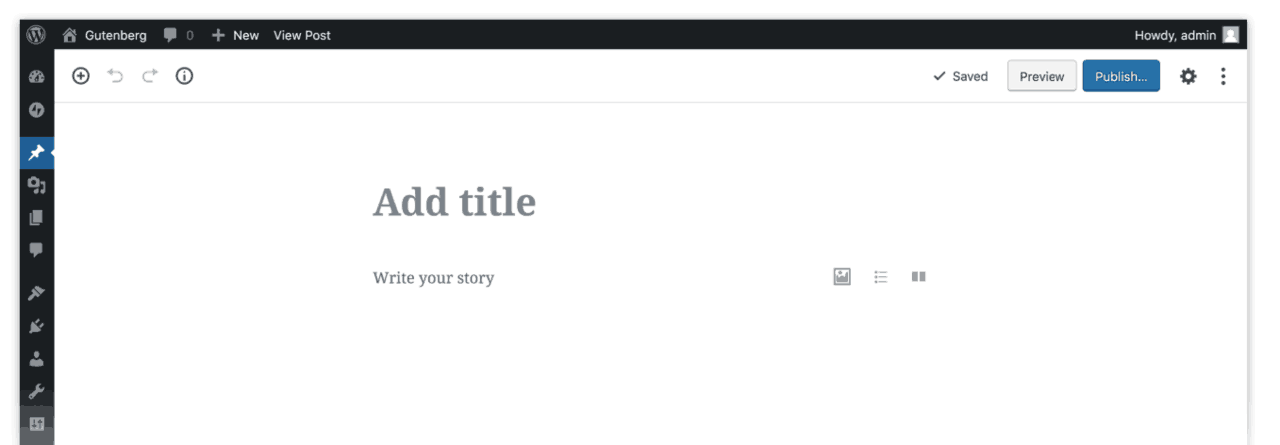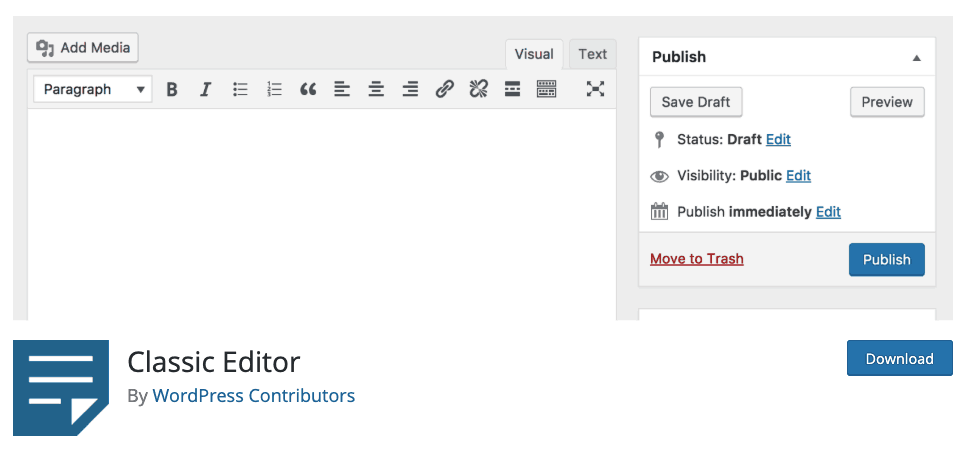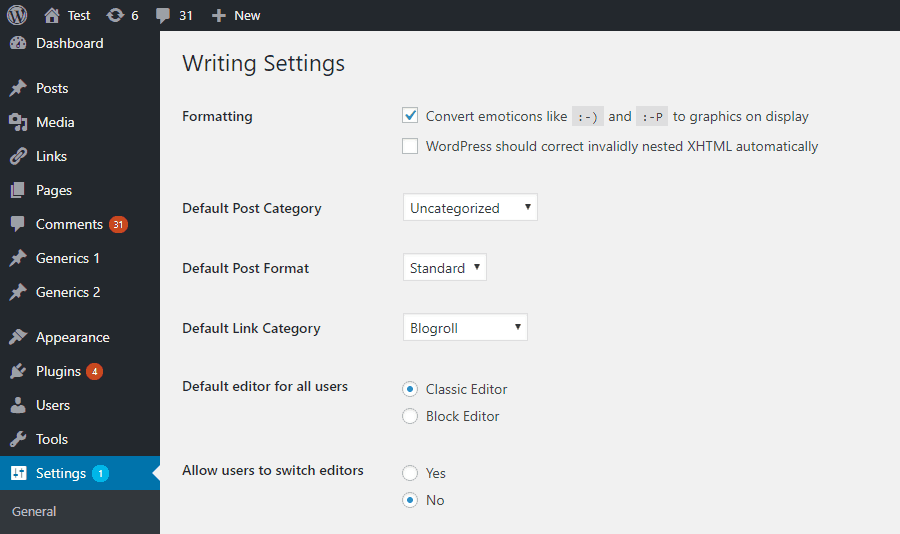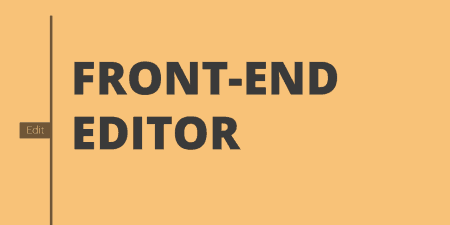Gutenberg is one of those WordPress plugins that everybody talks about, even if they don't…
The digital age we all live in is undoubtedly the most progressive one to date. Our lives are seemingly much easier and interesting, but it all has its downsides nonetheless. The Gutenberg update, for example. The latest version of our fav website WordPress 5.0 brought some stellar features and novelties, including a major change to the famous default editing experience we’ve all loved.
Basically, WordPress moved away from the classic editor and kinda, sorta, like, almost replaced it with the Gutenberg block editor.
It boils down to the fact that the bigger WordPress ecosystem with its themes and plugins wasn’t ready for this huge change. I mean it is potentially awesome, but we’ll still talk about our favorite – Classic editor.
First, we have to inform those of you who are not up to date (how dare you!) that the hardworking WordPress team has published a Classic WordPress editor for those of us who are not ready for the fancy new editing experience of Gutenberg. However, Gutenberg remains enabled as a default option, so you will need to revert back to the comfy and familiar settings of the Classic editor.
In order to maintain compliance with your current plugins and WP themes that haven’t been updated to fully support Gutenberg, just go back to the Classic editor for the time being. Needless to say, if everything you are using works great with Gutenberg then there is no need to switch.
A thing or two about Gutenberg
Gutenberg is indeed created with a goal to modernize the overall WordPress writing experience. It basically attempts to operate like a page builder plugin, so it allows you to drag and drop various items into a page or post. With many block plugins you can choose, you can use it to create the perfect website. It is designed to offer more flexibility for all WordPress users, as well as to help them create unique layouts for their content.

As good as that may sound, we are just not ready for it yet, and the reasons for our unwillingness to transition to Gutenberg vary. Some stick to the classic editor because of the additional money and time they’d have to spend adapting to Gutenberg. This becomes even more senseless considering the fact that most of us already have fully configured themes and appropriate plugins. Others want to continue using the premium quality plugins offered by Tiny, so using the Classic editor based on TinyMCE is both logical and convenient.
It is also important to note that some of us simply LIKE the classic editor more. One of its major advantages is the fact that it looks somewhat like Microsoft Word, and it has just one single editing field. Some might argue that it doesn’t provide its users with enough potions, but that is one of the reasons why it is easy to get used to.
Classic Editor plugin
To properly present the Classic Editor, we have to say that it is an official plugin maintained by the efficient WordPress team. It operates by restoring the previous WordPress editor, as well as the “Edit Post” screen. It enables you to use your plugins that extend the mentioned screen, add old-style meta boxes, or simply use the plugins that otherwise depend on the previous editor. Classic editor will be maintained and supported by the WP team until at least 2022, and even longer if it’s necessary.

What Classic editor mainly does and enables is the following:
- Administrators are able to select the default editor for all website users
- Administrators are able to allow their users to change their default editor
- Once allowed, users may choose which editor to use for every post
- Each post opens in that last editor used and it doesn’t matter who edited it last. This feature is particularly important for maintaining a consistent experience when the content is edited.
In addition to these features, the Classic Editor plugin includes a couple of filters that allow other plugins to control the settings, as well as editor choice for posts and for post types. Lastly, the Last Editor by default hides all functionality available with the new Gutenberg Block editor.

We are not ready, but let’s not make any rash decisions
So, to sum up, most users rightfully feel that Gutenberg, in its present state, is not ready to be applied to live sites. If you are sitting at home wondering how could I possibly know what majority of people think – ratings speak for themselves (buncha one star there).
On the other hand, the WordPress core team is still moving forward with developing Gutenberg and making it the default editor, so WordPress users are even more concerned. Thankfully, WordPress contributors are well aware of that. They’ve developed the Classic editor plugin to help us cope, while they continue working on the further development of Gutenberg and its features.
SO (*insert gif of Kurtis Conner clapping), to get back to your comfort-zone, install and activate the Classic Editor plugin. It works out of the box and it will swiftly disable the Gutenberg editor as soon as activated. Once you’ve made the change, don’t forget to click on the “save changes” to store your settings.

After that, you will be able to see a fresh link under the Posts menu, so you can create posts with the classic editor. You will also be able to edit your older articles by going to Posts, and then to All Posts page where you will see the “Edit (Classic)” link under the post. Furthermore, the Classic Editor plugin will let you keep both the Classic editor and Gutenberg at the same time.
Dude! It’s like Harry Styles AND Timothee Chalamet solving world peace problems together in one room. What more could you want?!
Overall
I recently read an article that spoke about the matter from the standpoint of someone who is not “afraid” to adapt to Gutenberg. I beg to differ. It’s not that we are “afraid” to use a different editor. We just like to feel cozy, and in order to feel that way, we prefer working with familiar things. Not to mention that our plugins are not ready for this, which makes the transition even harder. The Gutenberg editor remains a thing of the future for most of us for the time being and luckily, we have the Classic Editor plugin to help us in the present.






